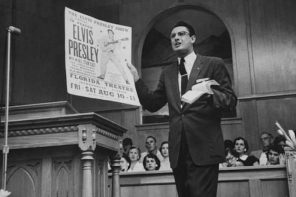Read all previous installments here, or better yet, never miss another feature by signing up for the RD Daily Newsletter here. You’ll receive our features and blogs every day in your inbox.
“Nobody has ever been able to put their finger on me because I’m not really here, at least not in the way they think I am. It’s all in their heads. What I’m into is mindlessness. I just empty myself out, so what people see is just a projection of their own needs. I don’t do or say anything.”
— Lou Reed, 1975[1]
Thirty-six years after the fact, looking back on my teenage-fanboy crushes on Jesus, then Ziggy, I can’t help wondering: What was that about? Was it all in my head, as Reed suggests? Were both icons just apotheosized projections of my awkward, alienated self—perfected personalities I dreamed of becoming through fastidious imitation (imitatio Dei). Ironically, isn’t that what both leper messiahs had done—passed as gods?
“Don’t dream it, be it” is the first commandment of celebrity culture, sung by Dr. Frank N. Further, the “sweet transvestite from Transsexual, Transylvania,” in the glam-camp musical The Rocky Horror Picture Show (which debuted, on the stage, in the Ziggy-mad year of 1973, and which, according to Bowie: A Biography by Marc Spitz, “David, Angie, and their entourage took in…multiple times…clearly taking notes in the margins of their programs”).[2] Weren’t Ziggy and Jesus really just transfigured fanboys, figments of their own worshipful imaginations who had wished their stardom into existence by “chucking out” the aspects of themselves they didn’t like and replacing them with “a completely new personality,” as Bowie put it?
Didn’t Bowie admit as much when he said, in 1972, “The artist doesn’t exist. He’s strictly a figment of the public’s imagination. None of us exist. We’re in the twilight zone. We’ll all go to hell, ‘cause we set ourselves up as gods”?[3] Doesn’t Jesus echo that same anguished sentiment when Pilate asks him, “Art thou the King of the Jews?,” in Mark 15:2, and he retorts, “Thou sayest it”? Across the centuries, we can still hear the world-weariness of the superstar who’s tired of serving as a movie screen for the wish-fulfillment fantasies of the multitude. “Watch me turn into Lou Reed before your very eyes,” Reed deadpans, on Take No Prisoners, the infamous live record on which he ritually trashes his greatest hits, mau-mauing hecklers and ranting about whatever crosses his drug-addled mind, like some gonzo Henny Youngman. “I do Lou Reed better than anybody, so I thought I’d get in on it.”
Lou Reed is the least likely Christian mystic ever: Jewish, bisexual, and in 1975 the twitchy-eyed, sallow-skinned larval form of some species of glam-rock stick insect. Yet his description of his fill-in-the-blanks persona—“I’m not really here…what people see is just a projection of their needs”—is weirdly consonant with the mystical Christian notion of kenosis, the emptying out of the self to make room for the indwelling spirit of God.
To the devout, the blurry apparitions of the messiah on Veronica’s Veil and the Shroud of Turin are palpable evidence of Christ’s historical reality and of his divinity. But they can also be read backwards, as visual metaphors for the shadow of a doubt that haunts all fandom: He’s not really here, at least not in the way you think he is. It’s all in your heads. Bowie is a palimpsest, his “authentic” self buried under centuries of evasion, dissembling, and self-mythologization. And the new-and-improved Bowie of recent years—frighteningly effervescent and teeth-lifted, last seen in a hoodie and sneakers, horsing around with the irrepressibly normal Ellen Degeneres—is no less a Warholian fabrication than Ziggy, the “totally credible plastic rock star—much better than any sort of Monkees fabrication” he became in order to ascend to pop godhood.[4] Who is Bowie? Is he just a constellation in the mass mind, the connected dots of all the data points we’ve gleaned from the media, most of them pure fakery, planted by the man who would be god (or at least a plastic god); who told an early interviewer, “I always had a repulsive sort of need to be something more than human…I thought, ‘Fuck that, I want to be a Superman’”?[5]
Speaking of supermen, who, for what matter, was Jesus? Bowie, who was probably thinking of something else at the time, once quipped that Hitler was “one of the first rock stars.” Maybe. Or maybe Andrew Lloyd Webber and Tim Rice were right, in Jesus Christ Superstar: Maybe Jesus was the first rock star, masterfully managing his public image, working the crowds like a show-biz pro, delivering every gnomic one-liner, every cryptic parable, every portentous aside with one eye on the only audience that really matters—the fans beyond number who will one day venerate him, a radical apocalyptic prophet born sometime around 4 BCE, as a god.
“I know that one day a big artist is going to get killed onstage, and I know that we’re going to go very big,” Bowie told an interviewer, in 1974. “And I keep thinking: it’s bound to be me. Go out on me first tour, get done in at me first gig, an’ nobody will ever see me. That would be wild.”[6] What better way to ensure celebrity immortality than to die young and glamorous, like glam-rocker Marc Bolan of T. Rex, your purple Mini wrapped around a Sycamore tree? Or, better yet, nailed to a tree, an iconic image made to order for the world tour that never ends? (As Judas asks, in the title song from Superstar, “Did you mean to die like that? Was that a mistake, or/did you know your messy death would be a record breaker?”)
Then again, the biblical scholar Bart D. Ehrman has argued persuasively that Jesus himself didn’t believe he was the messiah. Ehrman attributes Jesus’s deification to later sources with a vested interest in his mythologization—the Gary Peppers in Christ’s fan base.[7] “If we want to know about the historical Jesus, we are more or less restricted to using the four gospels, Matthew, Mark, Luke, and John,” Ehrman writes, in Jesus, Interrupted: Revealing the Hidden Contradictions in the Bible (And Why We Don’t Know About Them).
These are not disinterested accounts by eyewitnesses, however. They are books written decades after the fact by authors who had heard stories about Jesus from the oral tradition, stories that had been altered and even made up over time. There were lots of discrepancies in these stories, and the Gospel writers themselves changed them as they saw fit.[8]
It gets worse: we don’t even have the original fanzines in which these heavily embroidered tributes to a long-dead idol originally appeared. “Not only do we not have the originals” of the gospels, says Ehrman, “we don’t have the first copies of the originals. We don’t even have copies of the copies of the originals, or copies of the copies of the copies of the originals. What we have are copies made later—much later. In most instances, they are copies made many centuries later. And these copies all differ from one another, in many thousands of places.”[9]
Look at any messiah from the right angle, and you can still see yourself, the fan within, in a sort of inverted entheos. Bowie may be coolness incarnate, but shift your perspective slightly and he reveals another face, like the Christ of those lenticular postcards: the painfully lame Anthony Newley impersonator who warbled novelty ditties like “The Laughing Gnome,” whose chipmunk-voiced vocals and groaningly cornball puns make even the staunchest fans blanche in horror.
In Jazzin’ for Blue Jean, the promotional mini-movie for the song “Blue Jean” from his 1984 album Tonight, Bowie makes light of—and casts a psychoanalytic light on—the gap between his rock-god persona and his inner fanboy. Literalizing the Divided Self hinted at in his lyrics (specifically, in Man Who Sold the World’s recurrent references to his brother Terry’s schizophrenia) and on the iconic cover of Aladdin Sane, where a painted lightning bolt bisects his face, Bowie plays a painfully dorky fan named Vic and a swooningly cool popstar named Screamin’ Lord Byron. In his painted face and harem pants, Byron looks to the adoring camera eye like a glam-rock gloss on Yellow Book decadence: Aladdin Sane meets Valentino’s Sheik, as imagined by Aubrey Beardsley. But when he steals Vic’s girl in the final scene, Vic’s idol-worship curdles into Mark David Chapman-esque resentment: Byron, he sneers, is nothing but a “conniving, randy, bogus, Oriental old queen.”[10]
Similarly, Christians may believe Jesus is God incarnate, but through the magnifying glass of historicity he looks like a hairy-eyed, lapel-grabbing zealot, staple-gunning his Xeroxed screeds about the End of Days to every telephone pole in town.
Who raptured these guys out of mass anonymity, into the beatitude of celebrity? Wasn’t it us, the true believers who knew every line of every song by heart, singing along as Ziggy implored, on the razor’s edge between yearning and taunting,
Gimme your hands ‘cause you’re wonderful
Gimme your hands ‘cause you’re wonderful
In his marvelous exercise in amateur hermeneutics, Ziggy ’72: A Catalogue of Lost Objects, Bowie fan Harvey Molloy offers a poignant meditation on the fan-idol dynamic. Pondering fans’ role in apotheosizing one of their own, Molloy arrives at a realization of the entheos at the heart of all fan cultures, secular and religious: if what fans—believers, by any other name—are idolizing is really “just a projection of their own needs” (Reed), “a figment of the public’s imagination” (Bowie), then the object of their adoration, in a very real sense, lies within. “When [Ziggy] sings the finale,” writes Molloy,
I feel like I’m watching Jesus. He leans over the crowd at the end of the stage, his outstretched hands taunting the front row audience who would give anything to touch him.
Sublime, unobtainable, out of reach. I know that I will never speak to him…
Who is he, in the end, without his costumes, his make-up, the identity and signature he has invented for himself? Perhaps no one. Yet he’s also indispensable; larger than life, the one teaching us that by watching a performance you make it happen. For one moment, the gap between us closes and I know that the audience too is wonderful; we’re the wonderful ones who make it happen.[11]
Another fan, in another time, had the same thought:
Neither shall they say, Lo here! Or, lo there! for behold, the kingdom of God is within you.
— Luke 17:21
Endnotes
[1] Quoted in Mick Rock, Blood and Glitter (London, UK: Vision On Publishing, 2001), unnumbered page. [2] Marc Spitz, Bowie: A Biography (New York: Crown, 2009), p. 214. [3] Quoted in Mick Rock, Blood and Glitter (London, UK: Vision On Publishing, 2001), unnumbered page. [4] Ellen Degeneres: Search YouTube. As of this writing, an excerpt from the episode in question could be found here. “Totally credible plastic rock star”: Quoted in the booklet accompanying the Rykodisc expanded re-release of The Rise and Fall of Ziggy Stardust and the Spiders from Mars (1990), unnumbered page. [5] Quoted in George Tremlett, David Bowie: Living on the Brink, ibid., p. 20. [6] Quoted in Mick Rock, Blood and Glitter (London, UK: Vision On Publishing, 2001), unnumbered page. The quote in question is from 1974, but he expressed similar sentiments when Ziggymania was peaking, in ’73. [7] See Bart D. Ehrman, Jesus, Interrupted: Revealing the Hidden Contradictions in the Bible (And Why We Don’t Know About Them) (New York: HarperCollins, 2009), passim. [8] Bart D. Ehrman, Jesus, Interrupted: Revealing the Hidden Contradictions in the Bible (And Why We Don’t Know About Them) (New York: HarperCollins, 2009), p. 151. [9] Bart D. Ehrman, Misquoting Jesus: The Story Behind Who Changed the Bible and Why (New York: HarperCollins, 2005), p. 10. [10] Quoted in “Jazzin’ For Blue Jean” entry, Wikipedia. [11] Harvey Molloy, “Ziggy ’72: A Catalogue of Lost Objects,” archived on the fansite The Ziggy Stardust Companion.



